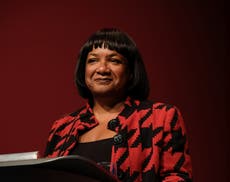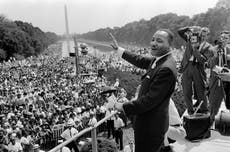We can celebrate diversity without erasing Blackness
This month should be a celebration of Black history, and I felt it had become diluted in an inappropriate attempt at inclusivity, writes Sylvie Carlos


At this time last year, if you’d asked me if Black History Month was relevant, I would have said “probably not”. I had stopped celebrating it years before, and I was feeling completely disheartened.
The memory of one incident in particular solidified my stance. In 2018, I had planned a Black History Month campaign for a local radio station. On the hour for a minute, listeners would hear about a monumental Black person throughout history who had inspired others. I felt really proud to have curated something that was shining a light on Black people in the London borough of Wandsworth.
I remember reading that Wandsworth Council had changed Black History Month to “Diversity Month”. At the time, I felt offended and exasperated. I reached out to the Wandsworth press office for a discussion about the rebranding, but I was told via email that Wandsworth had other ethnicities in the borough that also needed to be reflected, so renaming October “Diversity Month” worked best. This was the fourth year of the borough doing so.
If you’d told me this had happened outside London, I probably wouldn’t have been fazed. In fact, I might have channelled my grandma, who says “c’est la vie” when such things happen. But in multicultural London, the city that is home to the largest Black-British population in the UK, that was a real problem for me.
This month should have been a celebration of Black history, and I felt it had become diluted in an inappropriate attempt at inclusivity. I believe in diversity too, but it should not change the one month a year that celebrates Black history.
My rage was at a growing sense of the erasure of Black contributions and history in the UK, and for a grouping, whether verbalised or not, of everyone non-white into one “melting pot”. I’d still like to know who approved this decision. I genuinely wanted to speak to the manager at this point! It turns out that someone did speak to management, because Wandsworth has now renamed October “Black History Month”.
Fast forward to 2021 and I voiced my views on Black History Month in what was a brand-new workspace. At this point, I’d been with the company for about week, so it could have gone left, or “all over the gaff”, and the remaining five weeks of my contract could have been really awkward. But I didn’t hold back and neither did any of my colleagues.
The discussion was real, passionate and unfiltered. I say discussion, but it really turned into a fiery debate. Most importantly, though, it made me realise that even though our views were extremely different, I was at home among these colleagues. My colleagues were all Black men at different stages in their lives and of different ages, with some being more like my uncles than my older brothers. Regardless, I’m an equal opportunities debater and we went back and forth for the best part of an hour. You take away code-switching, sympathetic ally-soothing and cultural translations, and wow!
By sharing my thoughts in a safe space, where both freedom and accountability coexisted, I was able to have my perspective challenged. Fundamentally, we all deserve to be in safe spaces; spaces where we can be heard, feel seen and be challenged are invaluable. And this space allowed me to reflect and form an informed opinion on why I was so indifferent to a month that was essentially curated for people like myself.
After I’d taken the time to think and discuss, I understood that I was letting the actions of others inform the value I placed on a month that fundamentally wasn’t meant for the people who were making, in my opinion, wayward decisions about it.
I ended up sitting down and interviewing the founder of the UK’s Black History Month, Akyaaba Addai-Sebo. I’m not someone who gets starstruck, but I left that interview feeling enthused. Addai-Sebo spoke life into Black History Month. He believes in it just as strongly as he did in 1987, when he was part of a team that set it up.
To keep up to speed with all the latest opinions and comment sign up to our free weekly Voices Dispatches newsletter by clicking here
We discussed all aspects of Black History Month, from the origins of it – with him consoling his colleague when her son, named after the leader of the Pan Africanism movement Marcus Garvey, asked why he wasn’t white – to the month’s intentional October placing. In Africa, October is traditionally a time to look over the harvest and take stock, before going forth and replenishing.
It spoke to my soul because, as for many others, being Black is a 365 days a year occasion. I find myself so often on autopilot, jumping on to the next thing before finishing the first. But what I learned is that Black History Month provides a stillness; a whole month to take a pause and be intentional, while learning more about the legacy and accomplishments of Black people. And that is something I wouldn’t want to take away from anyone.
Ultimately, the UK’s Black history is my history. I am both Black and British, and I feel both a duty to contribute to that legacy and a pride in doing so. It’s not about looking at the relevancy. As long as there is a Black population in the UK, paving ways and leading conversations, Black history is being made.
Sylvie Carlos is a producer for 1Xtra Talks on BBC Radio 1Xtra. She also writes about books, mental health and travel




Join our commenting forum
Join thought-provoking conversations, follow other Independent readers and see their replies